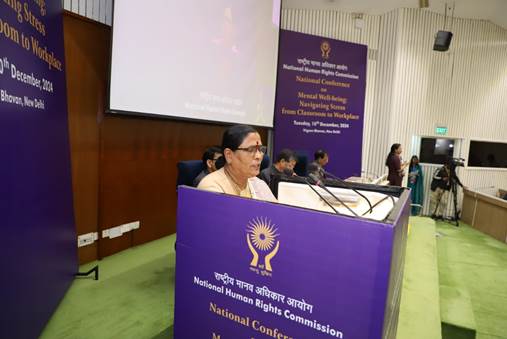NEW DELHI: A day-long national conference organised by National Human Rights Commission (NHRC) on ‘Mental Well-being: Navigating Stress from Classroom to Workplace’ at Vigyan Bhavan, New Delhi brought together experts, policymakers, and stakeholders to a common platform to discuss the relationship between mental health, stress, and well-being.
Delivering the keynote address in the inaugural session, NHRC acting Chairperson Vijaya Bharathi Sayani called for creating a world where mental health is not an afterthought but a fundamental aspect of how people live, work, and thrive.
Empathy and care
Pointing out that digital tools, along with revolutionising education, has left a little room for mental rest with distractions of social media, cyber-bullying, and overwhelming exposure to information, she suggested that teachers and administrators must be trained to recognise signs of distress and support the students.
Referring to increasing stress across all levels of professional hierarchy at workplaces, Sayani said organisations should go beyond organising wellness programmes to foster a genuine culture of empathy and care.
“Supportive relationships such as family are the cornerstone of mental well-being. We must acknowledge mental health as a shared responsibility and build a society that values well-being as much as it does achievement,” she said and underscored the significance of Indian scriptures that advise mental discipline and self-awareness in achieving peace.
NITI Aayog member V. K. Paul said that mental stress and well-being need a thorough understanding. “Discourse among various stakeholders is the key to finding solutions to this serious problem,” he said.
NHRC Secretary General Bharat Lal pointed out that over 1.7 lakh suicides were reported in 2022 alone, with 41% of victims under the age of 30. “This data underlines the urgent need for systemic change and multi-sectoral collaboration to address the crisis. People aged 15 to 24 years have the highest suicide rate in India,” he said.
Lal said that mental health is disproportionately affecting the youth, women and elderly. Referring to NHRC’s measures to improve mental healthcare, he mentioned its various concentrations and the seven key areas for action in this regard issued in its advisory.
NHRC Joint Secretary Devendra Kumar Nim gave an overview of the conference that saw three sessions—‘Stress among children and adolescents,’ ‘Mental health challenges in institutions of higher learning’ and ‘Stress and burnout at workplace.’ It aims to explore the psychological impacts of stress at various stages of life—from education to employment to propose recommendations to promote mental well-being across different sectors, he said.
Academic stress among students
Chairing the session on ‘Stress among children and adolescents’, V.K. Paul, while citing an NCERT survey that covered 4 lakh students, said 81% of the participants were found affected by anxiety about exams, 43% had mood swings due to excessive use of technology-driven communication tools, and mobile phones. He added that 60% of workplace professionals felt extreme or high stress. “It is necessary to create a mental healthcare system to pinpoint issues causing distress due to bullying, ragging, use of drugs, behavior of bosses, etc.,” he added.
The second session on ‘Mental health challenges in institutions of higher learning’ was chaired by UPSC Chairperson Preeti Sudan and co-chaired by Prof. Abhay Karandikar, Secretary, Department of Science & Technology. The speakers emphasised the need for better counseling services, mental health curriculum and awareness campaigns.
Stress management policies
The third session on ‘Stress and burnout at workplaces’ was chaired by Rajiv Kumar, former Vice Chairman of NITI Aayog, and co-chaired by Deepak Bagla, former CEO & MD of Invest India.
The speakers emphasised work-life balance, particularly among younger employees, and implementation of stress management policies, urging leaders to enforce strategies that reduce burnout and support mental health.


Comments are closed.